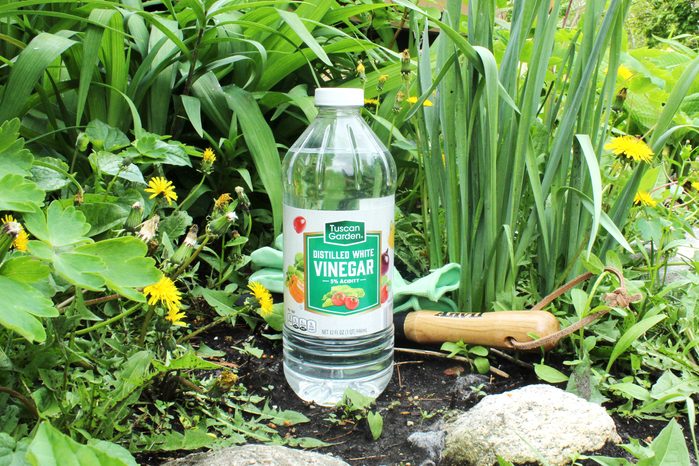7 Ways To Use Vinegar In the Garden — Or Not
Updated: Nov. 28, 2022

Gardening pros say that despite oodles of online claims to the contrary, vinegar is not all that effective or useful in your garden.
Using common vinegar in your garden is a lofty ideal, perhaps put into practice for generations by green-thumbed relatives or endorsed by neighbors who choose eco-friendly solutions to garden problems. Be wary. Researching and talking with experts will sour you on most of these practices.
“You want the truth?” says C.L. Fornari, a Cape Cod-based speaker, writer and radio host known as Garden Lady, “You can find lots of online articles about using vinegar in the garden. However, in most cases you should reserve household vinegar for salad dressing, and keep it out of your garden.”
Given that, here are seven touted uses for vinegar in the garden. Most come with a good dose of skepticism.
On This Page
Killing Weeds
Using vinegar as a natural weed killer substitute and spraying it on onto garden weeds has been promoted by many as a safer alternative to chemical-based weed killers,. It’s not.
“In most cases, you will kill the leaves but not the weed roots, so you’ll have to reapply the vinegar,” says Katie Dubow, president of the Garden Media Group in Kenneth Square, Pennsylvania. “It’s an alternative to using synthetic chemicals, but it’s not 100 percent effective.”
Fornari says household vinegar is only five percent acetic acid, which isn’t effective with perennial weeds. Vinegar that’s 20- to 30-percent acetic acid will kill the weeds but burn your skin and eyes, as well as damage your lungs.
“There are many other organic weed-control answers that are safe for you and your pets, such as weed killers that are iron-based and citrus-based,” Fornari says.
Lower pH of Soil
Pouring vinegar on soil will lower the pH, and alkaline soil is essential for growing blueberries. But you’ll need a lot of it because it’s a weak agent.
“Vinegar is not effective with lowering soil pH,” says Fornari. “Aluminum sulfate is, and research backs that up. Let’s be honest: Are you going to pour around the base of your plants something that you thought was a good weed killer?”
Dubow says gardeners sometimes play around with soil pH when they don’t know what the pH is. Before trying to lower soil pH, always do a soil test first to find out what it needs, if anything. One option is Tertill’s free soil test that comes with their customized fertilizers.
Cleaning Garden Tools
“The vinegar smell is a little intense,” says Dubow. But she says vinegar does work for cleaning garden tools, pots and outdoor furniture. Fornari says there’s no harm in using vinegar. “But a stiff brush and water with soap or bleach do the job as well as anything else,” she says.
Keep Animals Away
To keep unwanted critters out of your garden, soak rags in vinegar and place them in low places. But there are problems with this. “The vinegar evaporates,” says Fornari. “Plus, many animals are not repulsed. Rabbit and deer are vegan, so solutions that are blood-, milk- and egg-based work better.”
Stimulate Seed Growth
“Soaking seeds in a solution of one part vinegar and four parts water helps break down the seed’s outer layer and expedite germination,” Dubow says. But she also agrees with Fornari that soaking seeds in vinegar is unnecessary.
“To grow seeds, you just need water and sunlight,” says Fornari. “What do seeds do in nature? Is anybody out there pouring vinegar on seeds?”
Stop Ants
Dubow sprays peony blooms with one part vinegar to two parts water to prevent ants from entering her house after she picks the blooms. “The last thing you want is ants in your house,” she says.
Kill Fruit Flies
If you have fruit fly problems, mix apple cider vinegar, water, soap and honey in a jar, then hang up the jar. Dubow says fruit flies will be fatally attracted to this mixture.
You can find other uses for vinegar in the garden, but consider the source. “The Internet can be a dangerous neighborhood,” says Fornari. “Bad information gets passed along from site to site.” She recommends sticking with research from university extension services that end in .edu.
